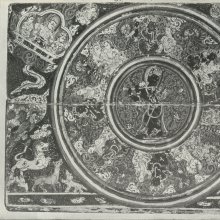Rasalila, Rāsalīlā, Rasa-lila: 1 definition
Introduction:
Rasalila means something in Hinduism, Sanskrit. If you want to know the exact meaning, history, etymology or English translation of this term then check out the descriptions on this page. Add your comment or reference to a book if you want to contribute to this summary article.
Images (photo gallery)
In Hinduism
Vaishnavism (Vaishava dharma)
Source: Pure Bhakti: Bhajana-rahasya - 2nd EditionRāsalīlā (रासलीला) refers to:—Śrī Kṛṣṇa’s dance pastimes with the vraja-gopīs, which is a pure exchange of spiritual love between Śrī Kṛṣṇa and the gopīs, His most confidential servitors. (cf. Glossary page from Bhajana-Rahasya).
Source: Pure Bhakti: Brhad BhagavatamrtamRāsalīlā (रासलीला) refers to:—Svayam Bhagavān’s supremely immaculate pastime of dancing with unlimited gopīs. (cf. Glossary page from Śrī Bṛhad-bhāgavatāmṛta).

Vaishnava (वैष्णव, vaiṣṇava) or vaishnavism (vaiṣṇavism) represents a tradition of Hinduism worshipping Vishnu as the supreme Lord. Similar to the Shaktism and Shaivism traditions, Vaishnavism also developed as an individual movement, famous for its exposition of the dashavatara (‘ten avatars of Vishnu’).
See also (Relevant definitions)
Partial matches: Lila, Rasa, Raca.
Query error!
Full-text: Carvitapatraka, Rasamandala, Lila, Vrindavana, Rajayoga, Hamsa, Rasa, Lala, Ras, Lalita.
Relevant text
Search found 25 books and stories containing Rasalila, Rāsalīlā, Rasa-lila, Rāsa-līlā; (plurals include: Rasalilas, Rāsalīlās, lilas, līlās). You can also click to the full overview containing English textual excerpts. Below are direct links for the most relevant articles:
Chaitanya Bhagavata (by Bhumipati Dāsa)
Verse 1.1.22 < [Chapter 1 - Summary of Lord Gaura’s Pastimes]
Verse 1.1.26 < [Chapter 1 - Summary of Lord Gaura’s Pastimes]
Verse 1.1.40 < [Chapter 1 - Summary of Lord Gaura’s Pastimes]
Brihad Bhagavatamrita (commentary) (by Śrī Śrīmad Bhaktivedānta Nārāyana Gosvāmī Mahārāja)
Verse 1.7.154-155 < [Chapter 7 - Pūrṇa (pinnacle of excellent devotees)]
Verse 1.7.82 < [Chapter 7 - Pūrṇa (pinnacle of excellent devotees)]
Verse 1.7.159 < [Chapter 7 - Pūrṇa (pinnacle of excellent devotees)]
Bhakti-rasamrta-sindhu (by Śrīla Rūpa Gosvāmī)
Verse 2.1.211 < [Part 1 - Ecstatic Excitants (vibhāva)]
Verse 2.1.343 < [Part 1 - Ecstatic Excitants (vibhāva)]
Verse 2.1.209 < [Part 1 - Ecstatic Excitants (vibhāva)]
Bhajana-Rahasya (by Srila Bhaktivinoda Thakura Mahasaya)
Text 23 < [Chapter 6 - Ṣaṣṭha-yāma-sādhana (Sāyaṃ-kālīya-bhajana–bhāva)]
Text 25 < [Chapter 8 - Aṣṭama-yāma-sādhana (Rātri-līlā–prema-bhajana sambhoga)]
Text 17 < [Chapter 8 - Aṣṭama-yāma-sādhana (Rātri-līlā–prema-bhajana sambhoga)]
Bhagavata Purana (by G. V. Tagare)
Part 4 - The Teaching of the Bhāgavata Purāṇa < [Introduction]
Chapter 12 - The Performance and Renunciation of Prescribed Karmas < [Book 11 - Eleventh Skandha]
Chapter 29 - Lord Kṛṣṇa’s Rāsa with Gopīs < [Book 10 - Tenth Skandha]
Srila Gurudeva (The Supreme Treasure) (by Swami Bhaktivedanta Madhava Maharaja)
The Closing of His Pastimes < [Chapter 2.19 - The Concluding Transcendental Pastimes]
Sthayi-bhava never changes < [Chapter 1.2 - Śrīla Gurudeva’s Pūrvāśrama]
Entering Naiśa-līlā (the Night Pastimes) < [Chapter 2.19 - The Concluding Transcendental Pastimes]
Related products

